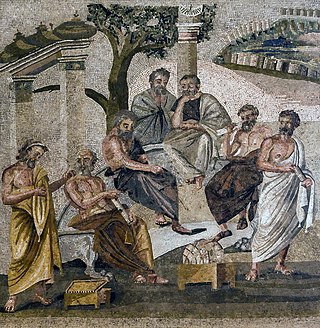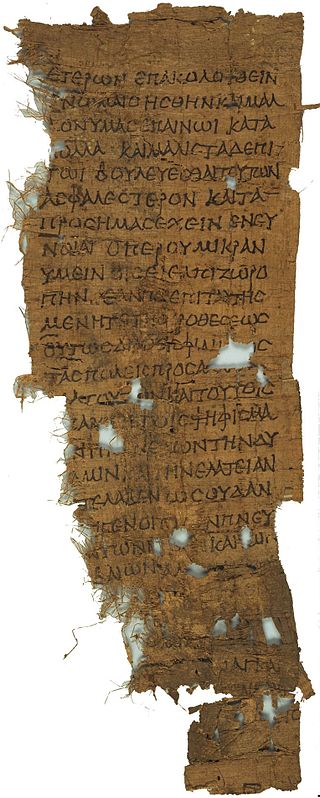Related Research Articles

Rhetoric is the art of persuasion. It is one of the three ancient arts of discourse (trivium) along with grammar and logic/dialectic. As an academic discipline within the humanities, rhetoric aims to study the techniques that speakers or writers use to inform, persuade, and motivate their audiences. Rhetoric also provides heuristics for understanding, discovering, and developing arguments for particular situations.
The Trial of Socrates was held to determine the philosopher's guilt of two charges: asebeia (impiety) against the pantheon of Athens, and corruption of the youth of the city-state; the accusers cited two impious acts by Socrates: "failing to acknowledge the gods that the city acknowledges" and "introducing new deities".

Pericles was a Greek politician and general during the Golden Age of Athens. He was prominent and influential in Ancient Athenian politics, particularly between the Greco-Persian Wars and the Peloponnesian War, and was acclaimed by Thucydides, a contemporary historian, as "the first citizen of Athens". Pericles turned the Delian League into an Athenian empire and led his countrymen during the first two years of the Peloponnesian War. The period during which he led Athens, roughly from 461 to 429 BC, is sometimes known as the "Age of Pericles", but the period thus denoted can include times as early as the Persian Wars or as late as the following century.

Demosthenes was a Greek statesman and orator in ancient Athens. His orations constitute a significant expression of contemporary Athenian intellectual prowess and provide insight into the politics and culture of ancient Greece during the 4th century BC. Demosthenes learned rhetoric by studying the speeches of previous great orators. He delivered his first judicial speeches at the age of 20, in which he successfully argued that he should gain from his guardians what was left of his inheritance. For a time, Demosthenes made his living as a professional speechwriter (logographer) and a lawyer, writing speeches for use in private legal suits.
A sophist was a teacher in ancient Greece in the fifth and fourth centuries BC. Sophists specialized in one or more subject areas, such as philosophy, rhetoric, music, athletics and mathematics. They taught arete, "virtue" or "excellence", predominantly to young statesmen and nobility.

Ancient Greece was a northeastern Mediterranean civilization, existing from the Greek Dark Ages of the 12th–9th centuries BC to the end of classical antiquity, that comprised a loose collection of culturally and linguistically related city-states and other territories. Most of these regions were officially unified only once, for 13 years, under Alexander the Great's empire from 336 to 323 BC. In Western history, the era of classical antiquity was immediately followed by the Early Middle Ages and the Byzantine period.

Polis, plural poleis, means 'city' in Greek. In Ancient Greece, it originally referred to an administrative and religious city center as distinct from the rest of the city. Later, it also came to mean the body of citizens under a city's jurisdiction. In modern historiography, the term is normally used to refer to the ancient Greek city-states, such as Classical Athens and its contemporaries, and thus is often translated as 'city-state'. The poleis were not like other primordial ancient city-states such as Tyre or Sidon, which were ruled by a king or a small oligarchy; rather, they were political entities ruled by their bodies of citizens.

Isocrates was an ancient Greek rhetorician, one of the ten Attic orators. Among the most influential Greek rhetoricians of his time, Isocrates made many contributions to rhetoric and education through his teaching and written works.
Ancient Greek philosophy arose in the 6th century BC. Philosophy was used to make sense of the world using reason. It dealt with a wide variety of subjects, including astronomy, epistemology, mathematics, political philosophy, ethics, metaphysics, ontology, logic, biology, rhetoric and aesthetics. Greek philosophy continued throughout the Hellenistic period and later evolved into Roman philosophy.

Lysias was a logographer in Ancient Greece. He was one of the ten Attic orators included in the "Alexandrian Canon" compiled by Aristophanes of Byzantium and Aristarchus of Samothrace in the third century BC.

Paideia referred to the rearing and education of the ideal member of the ancient Greek polis or state. These educational ideals later spread to the Greco-Roman world at large, and were called humanitas in Latin. Paideia was meant to instill aristocratic virtues in the young citizen men who were trained in this way. An ideal man within the polis would be well-rounded, refined in intellect, morals, and physicality, so training of the body, mind, and soul was important. Both practical, subject-based schooling as well as a focus upon the socialization of individuals within the aristocratic order of the polis were a part of this training. The practical aspects of paideia included subjects within the modern designation of the liberal arts, as well as scientific disciplines like arithmetic and medicine. Gymnastics and wrestling were valued for their effect on the body alongside the moral education which was imparted by the study of music, poetry, and philosophy. This approach to the rearing of a well-rounded Greek male was common to the Greek-speaking world, with the exception of Sparta where agoge was practiced.

The Academy was founded by Plato in c. 387 BC in Athens. Aristotle studied there for twenty years before founding his own school, the Lyceum. The Academy persisted throughout the Hellenistic period as a skeptical school, until coming to an end after the death of Philo of Larissa in 83 BC. The Platonic Academy was destroyed by the Roman dictator Sulla in 86 BC.
Ancient Greek laws consist of the laws and legal institutions of ancient Greece.

"On the Crown" is the most famous judicial oration of the prominent Athenian statesman and orator Demosthenes, delivered in 330 BC.

A funeral oration or epitaphios logos is a formal speech delivered on the ceremonial occasion of a funeral. Funerary customs comprise the practices used by a culture to remember the dead, from the funeral itself, to various monuments, prayers, and rituals undertaken in their honour. In ancient Greece and, in particular, in ancient Athens, the funeral oration was deemed an indispensable component of the funeral ritual.

Demosthenes was a prominent Greek statesman and orator of ancient Athens. His orations constitute the last significant expression of Athenian intellectual prowess and provide a thorough insight into the politics and culture of ancient Greece. The Alexandrian Canon compiled by Aristophanes of Byzantium and Aristarchus of Samothrace recognized Demosthenes as one of the ten greatest Attic orators and logographers. Cicero acclaimed him as "the perfect orator" and the one who "has pre-eminence over all others", while Quintilian extolled him as lex orandi.
Robin Anthony Herschel Waterfield is a British classical scholar, translator, editor, and writer of children's fiction.
Education for Greek people was vastly "democratized" in the 5th century B.C., influenced by the Sophists, Plato, and Isocrates. Later, in the Hellenistic period of Ancient Greece, education in a gymnasium school was considered essential for participation in Greek culture. The value of physical education to the ancient Greeks and Romans has been historically unique. There were two forms of education in ancient Greece: formal and informal. Formal education was attained through attendance to a public school or was provided by a hired tutor. Informal education was provided by an unpaid teacher and occurred in a non-public setting. Education was an essential component of a person's identity.
Hellenic historiography involves efforts made by Greeks to track and record historical events. By the 5th century BC, it became an integral part of ancient Greek literature and held a prestigious place in later Roman historiography and Byzantine literature.
Phaedrus, son of Pythocles, of the Myrrhinus deme, was an ancient Athenian aristocrat associated with the inner-circle of the philosopher Socrates. He was indicted in the profanation of the Eleusinian Mysteries in 415 during the Peloponnesian War, causing him to flee Athens.
References
- ↑ "Harvey Yunis | Department of Modern and Classical Literatures and Cultures | School of Humanities | Rice University". cultures.rice.edu. Retrieved 2022-05-29.
- ↑ "Harvey Yunis | Department of Modern and Classical Literatures and Cultures | School of Humanities | Rice University". cultures.rice.edu. Retrieved 2022-05-29.
- ↑ Yunis, Harvey (1988-12-22). "Law, Politics, and the Graphe Paranomon in Fourth-Century Athens". Greek, Roman, and Byzantine Studies. 29 (4): 361–382. ISSN 2159-3159.
- ↑ "The Magazine of the School of Humanities at Rice University Spring PDF Free Download". docplayer.net. Retrieved 2022-05-29.